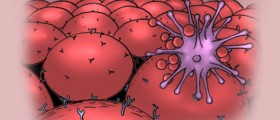
Information on Acute gastritis
Acute gastritis is an umbrella terms which is used for awide variety of entities which are known for causing inflammatory conditions inthe gastric mucosa. These entities have unique histologic characteristics eventhough they share the same general clinical presentation. Gastritis may affectonly certain regions of the stomach and in those cases it is referred to asantral gastritis, or it may affect the entire stomach. Acute gastritis may beerosive or nonerosive. Gatric symptoms such as vomiting, nausea and abdominalpain are not related to microscopic inflammations. Most patients who sufferfrom acute gastritis are asymptomatic and they are diagnosed with this medicalcondition during endoscopy which usually takes place for some other reasons.The most common symptoms of acute gastritis include abdominal bloating,belching, loss of appetite, vomiting, nausea and nondescript epigastricdiscomfort. Some cases of acute gastritis may also be accompanied by painfulsensations in the abdomen. These cases are usually what are being referred toas phlegmonous gastritis. It is not usual for people who suffer fromphlegmonous gastritis to also experience certain other symptoms such as hiccups,chills and sometimes even fever. Acute gastritis is commonly diagnosed bytaking biopsy specimens during the process of endoscopy. Acute gastritis usually affects people whoare older than 60, and there are approximately 2 million people in the UnitedStates who suffer from this specific type of medical condition.
Pathophysiology
There are a large number of different causes of acutegastritis but the most common ones include direct trauma, food poisoning,allergies, radiation, shock, acute stress, fungal infections, viral infections,bacterial infections, ischemia, bile, alcohol and various different types ofdrugs. The imbalance of all the defensive and aggressive factors which areresponsible for the integrity of the gastric lining is what can be defined asthe common mechanism of injury in all cases of acute gastritis. Reactive gastritisoccurs when the person gets exposed to a wide variety of different types offactors or agents. These include ischemia, bile reflux, radiation, stress,cocaine, alcohol and NSAIDs. Erosive gastritis is commonly associated withagents such as naproxen, ibuprofen and other types of NSAIDs. Acute gastritismay also be triggered by different types of viral infections, bacterialinfections, tuberculosis, secondary syphilis of the stomach and sometimes evenparasitic infections, among other factors. All these causes determine differenttreatment methods which are supposed to be used.

















Your thoughts on this
Loading...